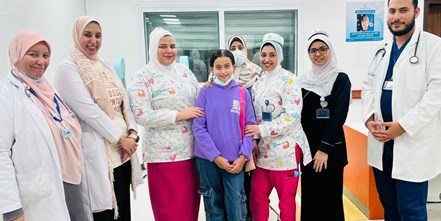



Healthcare Authority Successfully Performs First Renal Artery Dilation Catheterization for a Child Under the Universal Health Insurance System
Chairman of the Healthcare Authority: The success of this catheterization procedure reflects the efficiency of the medical teams at the Healthcare Authority and their commitment to providing world-class medical services.
Chairman of the Healthcare Authority: The cost of renal artery dilation via catheterization outside the universal health insurance coverage amounts to EGP 200,000, while the patient only pays EGP 450 as a co-payment.
The Healthcare Authority has announced the successful completion of the first-ever renal artery dilation catheterization procedure for a pediatric patient under its facilities. The groundbreaking procedure was performed on a 12-year-old girl at Al-Nasr Specialized Children's Hospital in Port Said, marking a milestone in pediatric interventional care across the universal health insurance system.
According to the Authority’s statement, the child was admitted to the emergency department at Al-Nasr Hospital suffering from severe abdominal pain and persistent vomiting. The pediatric medical team immediately assessed her condition, recommending an abdominal ultrasound, which revealed a significant narrowing in the renal artery. Subsequent monitoring of her blood pressure showed consistently high levels despite being on four different antihypertensive medications. Further diagnostic imaging, including echocardiography and CT angiography, confirmed a severe stenosis in the right renal artery.
A multidisciplinary medical team, comprising specialists in pediatrics, nephrology, vascular surgery, and pediatric cardiology, was assembled to devise an appropriate treatment plan. Under the supervision of vascular surgery consultants, the child underwent a successful renal artery dilation catheterization. Following the procedure, she was kept under observation for two days before being discharged in stable condition.
The statement also acknowledged the distinguished medical team behind the successful procedure, led by Dr. Abdelrahman Al-Afifi, Consultant and Head of Pediatric Cardiology and Congenital Heart Defects Catheterization at Al-Nasr Specialized Hospital in Port Said, and also Head of Pediatric Cardiology and Congenital Defects at the Magdi Yacoub Center in Aswan. He was joined by Dr. Mohamed Labib Mamoun, Consultant Vascular Surgeon and Head of Vascular Surgery at Al-Salam Hospital in Port Said, and Dr. Ahmed Ramadan, Specialist in Vascular Surgery at Al-Salam Hospital in Port Said. The procedure was also supported by a highly skilled nursing team, including Aya Ibrahim, Islam Shuaib, and Aya Al-Rifai from Al-Nasr Specialized Hospital.
Dr. Ahmed El-Sobky, Chairman of the Healthcare Authority and General Supervisor of the Universal Health Insurance Project, emphasized that the successful completion of this catheterization highlights the exceptional expertise of the medical teams operating within the Authority's facilities. He further noted that the Authority’s hospitals are equipped to handle highly complex medical cases using the latest global technologies.
"This achievement would not have been possible without our highly qualified and specialized medical personnel, who operate according to the highest international quality standards. It also showcases the outstanding collaboration between different medical specialties to ensure optimal care for beneficiaries of the universal health insurance system. Our hospitals are now recognized as leading medical institutions that rival top international healthcare providers, particularly in highly specialized fields," Dr. El-Sobky stated.
He also pointed out that the cost of such a procedure outside the universal health insurance system typically reaches EGP 200,000, whereas under the system, the child’s family was required to pay only EGP 450 as a co-payment. This underscores the critical role of the universal health insurance system in alleviating financial burdens on citizens while ensuring access to high-quality medical care within their governorates, eliminating the need for long-distance travel to receive advanced treatment.